Ali, JD.com, and ByteDance are pouring in one after another. Is "Internet + Healthcare" the next community group buying?
Text | AgeClub
Editor | Chen Miao
Foreword:
In March 2021, JD.com Health Geriatric Medical Center was officially launched, and Ali Health launched a gold nurse at the same time.
After the epidemic, almost all major Internet companies are actively deploying medical and health care. The huge demand for health care exposed by the epidemic has accelerated the layout and entry of Internet Tech Giants into the medical and health field. Recently, from the latest trends of Internet companies such as Alibaba and JD.com in the field of health services, their determination to implement Internet thinking into elderly health services has been landed.
It is undeniable that the Internet has changed the world, and its influence continues to permeate the life scenes covering food, clothing, housing and transportation. For traditional industries, every influx of Internet Tech Giants will inevitably bring a shock to the industry. Therefore, the dynamics of Internet Tech Giants in the field of elderly care services have also been paid attention to and even given expectations. This article will start from the dynamics of Internet Tech Giants in the field of medical and health care, and then explore where the development of the Internet health industry will go.
Internet Tech Giants Deepen Digital Penetration in Health Services
As early as in the community group buying war, there was speculation that since Internet Tech Giants have entered the community business, will any of them see the rich elderly care services in the community? It has been proved that Internet Tech Giants cut into medical health, and then from medical health into elderly care services, has been gradually carried out.
1. ByteDance: A Preliminary Study in the Field of Healthcare
According to public information, as of February 1, 2021, ByteDance has made a total of 37 foreign investments in the past 13 months. In addition to continuing to increase investment in education, Enterprise Services, and gaming, it has continued to build up the ante technology and started a new layout in medical, consumer, and other fields.
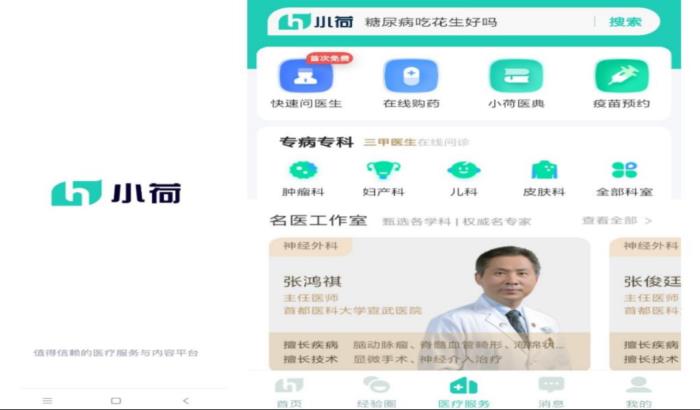
Figure: Xiaohe APP under ByteDance
In November 2020, ByteDance launched its first business brand "Xiaohe Medical" in the medical and health field, and also released the Xiaohe Doctor App for doctors and the Xiaohe App for consumers. This is a comprehensive medical app that includes online consultation, medical consultation, medical records, health assessment and other functions to benchmark Ali Health, Ping An Good Doctor.
2. Baidu: Betting on "AI" – the "reputation" battle of the old Internet giants
In the early days, Baidu entered the medical and health track with medical knowledge sharing and medical information retrieval, but its health services were widely criticized, especially in the field of medical search. Baidu was strongly criticized by the public for the "Wei Zexi incident", and medical bidding advertising accidents occurred frequently. Baidu was also under tremendous pressure from public opinion.

Picture: Lingyi Zhihui, a subsidiary of Baidu
According to public information, with the help of AI technology, Baidu has created an AI medical smart medical platform – Lingyi Zhihui, and provided medical institutions with five technical solutions: Clinical Assisted Decision System (CDSS), Fundus Image Analysis System, Medical Big Data Solution, Intelligent Pre-diagnosis Assistant, and Chronic Disease Management.
At present, this part of the business is mainly for the B-end market, providing technical support for hospitals. This also shows that in the future, user traffic in the Internet medical industry will come more from the hospital and the health end, and will also give birth to more B-end cooperation. The coordinated development of government and enterprises has become the mainstream.
3. Tencent: Investment + cooperation, cutting into the field of big health
Tencent’s current layout in the field of big health includes the layout based on Tencent’s product WeChat, the construction of service platforms, the release of AI + medical products, and the establishment of offline clinics. In addition, Tencent has also made a lot of investment in other big health industries. Tencent has successively raised $170 million for Lilac Garden and Registered Network (later renamed WeDoctor Group).

Picture: Tencent Medical Code, a subsidiary of Tencent
At present, Tencent’s own medical products include: WeChat smart hospital, smart hardware product sugar doctor, insurance platform micro insurance, medical science platform Tencent medical code, medical artificial intelligence platform Tencent Miying.
4. Ali/JD.com: From pharmaceutical retail to health services
JD.com and Ali, as Internet manufacturers that started as e-commerce companies, have natural advantages in engaging in medical and health care: that is, through Taobao, Tmall, Alipay, JD.com and other traffic entrances, consumer medical services can reach users in an all-round way.
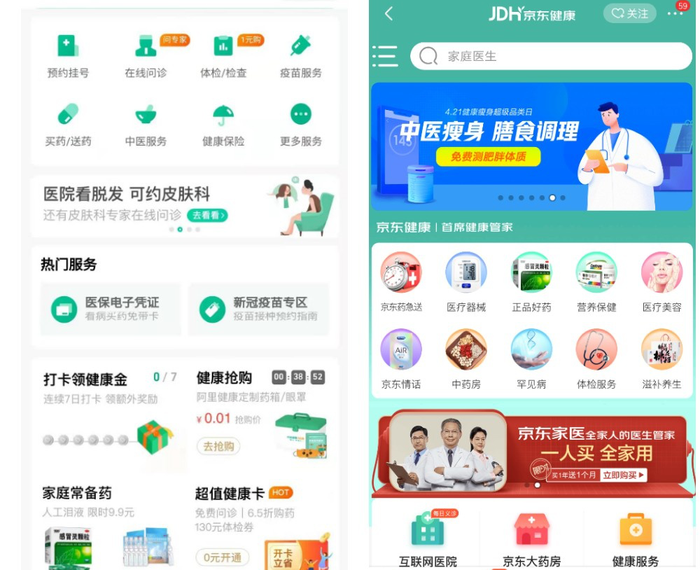
Picture: Ali Health and JD.com Health are both in
Alipay, Taobao and JD.com interface to open independent sections
In addition to their common drainage advantages, their layouts in the medical and health field are similar, with their businesses mainly focusing on pharmaceutical e-commerce, Internet hospitals, smart elderly care, and consumer healthcare.
In terms of medical health, after years of layout, Ali Health and JD.com Health have developed relatively mature. In the field of smart medical care, they mainly rely on artificial intelligence. Ali and JD.com currently have a number of smart products. Its "Internet medical" business is mainly to cooperate with a number of hospitals to provide patients with one-stop services from registration, consultation to drug purchase. Of course, there are health codes, cloud consultation, consumer medical and other businesses.
In several major sectors, they have great advantages in the Internet pharmaceutical retail track and are also the most mature. But at present, they are obviously not satisfied with the existing status quo, but have chosen to withdraw from the comfort zone of drug sales and circulation, gradually focus on health services, and try to gnaw this hard bone.
In the health service section, the Alipay [Medical Health] channel has recently launched the "door-to-door care" section. Alipay users can conveniently book nurse door-to-door care services provided by gold nurses through the App, including door-to-door injections, door-to-door dressing changes, after-hospital care, post-operative rehabilitation, medical assistance, and so on.
Summary: Internet giants entering the health service market have obvious advantages in terms of capital, technology, traffic, brand influence, etc., and their layout in the medical and health field is very similar, which shows that the business model of "Internet + medical and health" has been relatively mature.
Policy support, market and epidemic catalysis, Internet + medical health ushered in new development
Internet companies have entered the medical and health track one after another, which is inseparable from the dual drive of policy and market.
1. Favorable policy support
The "Internet + medical and health" model has been apparent in the industry for many years, and the national policy level has also listed informatization and standardization as the focus of national medical and health work.
At the policy level, the relevant provisions of "Internet + Drug Circulation" have been greatly relaxed. On November 12, 2020, the State Drug Administration officially released the "Drug Network Sales Supervision and Administration Measures (exposure draft) ". Compared with the previous round of exposure draft, the striking breakthrough of this draft is to "conditionally liberalize" online prescription drug sales, and clearly define some vague areas.
Many industry insiders said that if this management method is implemented, it will help to standardize the Internet drug sales behavior, and also help brand pharmaceutical retail enterprises to develop drug Internet sales. "The sales pattern of online prescription drugs may be re-divided."
At the same time, "Internet +" is also gradually included in the coverage of medical insurance. In August 2019, the National Medical Insurance Administration issued the "Guiding Opinions on Improving the Price of" Internet + "Medical Services and Medical Insurance Payment Policies", proposing unified guidelines on the project management and pricing mechanism of "Internet + Medical Services" and incorporating them into the coverage of medical insurance.
This move is also a key link in the development of Internet medical care. The promotion of electronic medical insurance cards across the country is conducive to the implementation of medical insurance card-free payment and the development of Internet medical care.
2, our country’s pension health industry has huge growth space
The current status of China’s elderly care industry, whether it is real-estate institutional elderly care or home-based community elderly care, the common problem they face is the lack of high-quality medical services. Although there are currently elderly care products and services for the disabled and semi-disabled elderly, it is difficult to meet the needs of China’s huge number of elderly people who lack the ability to live by themselves in both quantity and quality.
Through the intervention of Internet technology, social resources and medical resources can be efficiently allocated, and resource utilization can be maximized. Implant "Internet +" into the medical and elderly care system, starting from the diversified needs of the elderly, re-examine the relationship between elderly care and medical services, alleviate the contradiction between supply and demand of elderly care services, and efficiently allocate medical resources.
3, the epidemic gave birth to Internet + health services
Previously, we have analyzed that the epidemic has spawned a community group buying market, which has caused Internet Tech Giants to flood into the community group buying war, bringing new business opportunities to community pension projects. In fact, in addition to community group buying, during the epidemic, the Internet medical industry has also shown explosive growth.
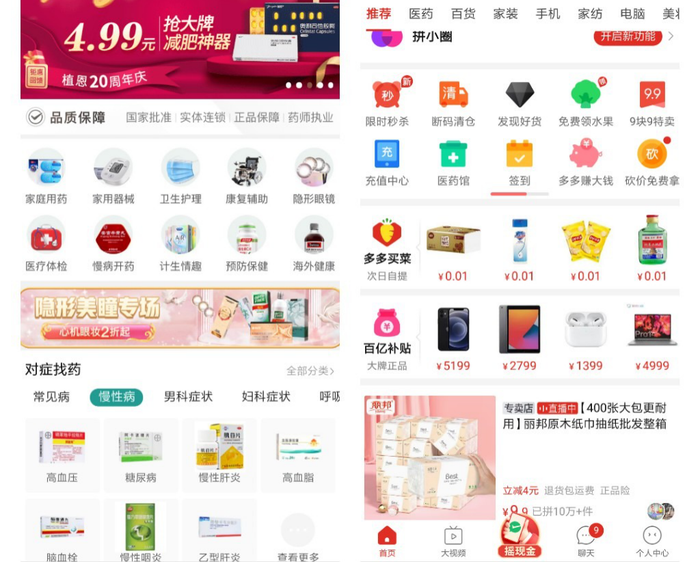
Picture: "Medical Museum" on the homepage of the Pinduoduo APP
According to public data, as of June 2020, there are nearly 600 Internet hospitals listed nationwide. As of now, Internet companies such as ByteDance, Alibaba, JD.com, Tencent, Pinduoduo, and Ele.me have medical and health tracks. For the huge medical and health market inspired by the epidemic, the "rich and powerful" Internet platform now sees a stage where it can show its skills.
4. It is the general trend for Internet companies to enter the medical and health track
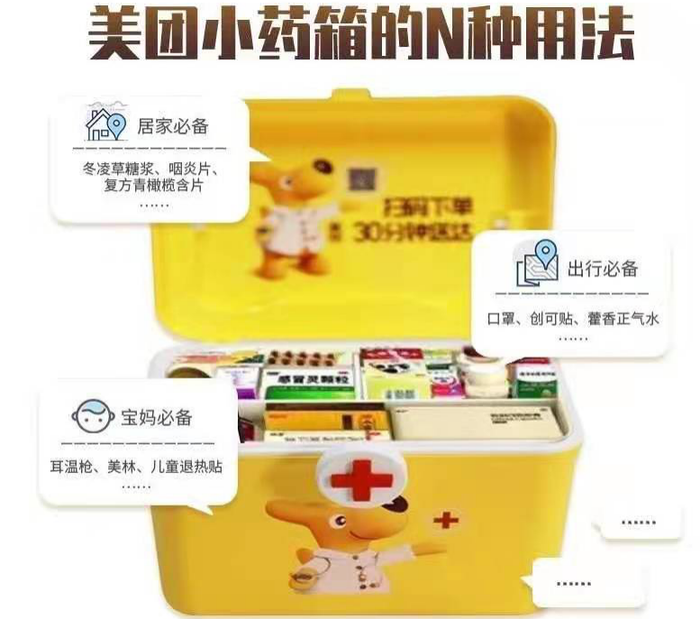
Picture: Meituan "Internet celebrity" small medicine cabinet
The huge pharmaceutical market has allowed Meituan takeaway, Ele.me and other takeaway platforms with huge traffic advantages to also enter the pharmaceutical e-commerce market and enter the pharmaceutical O2O market. As early as 2015, Meituan takeaway had a comprehensive cooperation with the pharmaceutical O2O platform Jingle Kuaiyao, adding a "medicine" entrance, providing users with a "28-minute home delivery" service, and jointly building the country’s largest pharmaceutical O2O platform. In terms of operation, Meituan launched the "0.01 yuan to buy a small medicine cabinet" activity some time ago, which has also attracted a large number of users.
Alibaba, JD.com and other Internet giants have turned from pharmaceutical retailers to elderly care service providers, and the current entry into elderly health services has also caused a lot of shock in the elderly care circle. The actions of Internet Tech Giants, which are industry vane, also seem to suggest that health services promoted by the Internet medical ecosystem are one of the important trends in the future development of the health care industry.
Internet companies are entering medical and health services
Key features and trends
1. Pharmaceutical e-commerce is the starting point of Internet Tech Giants’ cross-border medical and health care, and it is also its main source of revenue
Whether it is a traditional Internet medical platform such as Ping An Good Doctor, WeDoctor or a rookie in the industry such as Ali Health and JD.com Health, medicine is the main source of its revenue. According to Ali’s 2020 financial report, Ali Health’s revenue in fiscal 2020 was 9.60 billion yuan, of which, the revenue of the pharmaceutical self-operated business reached 8.13 billion yuan, accounting for 84.8%, and the pharmaceutical e-commerce platform business was 1.17 billion yuan, accounting for 12.2%. The two together accounted for 97%. The pharmaceutical e-commerce business provoked the "big beam" of Ali Health’s revenue.
Similarly, according to public information, JD.com Health’s total revenue in the first half of 2020 8.80 billion, and the revenue of pharmaceutical e-commerce was about 7.70 billion, accounting for about 87.6%.
As an established Internet medical enterprise platform, Ping An Good Doctor and WeDoctor are similar to Ali Health and JD.com Health in that their main sources of revenue are pharmaceutical e-commerce. However, compared with Internet Tech Giants, which has an inherent traffic advantage, its pharmaceutical retail does not have much advantage.
According to public information, Ping An Good Doctor’s annual revenue in 2020 was 6.866 billion yuan, and the revenue of the pharmaceutical e-commerce business "Health Mall" was 3.713 billion yuan, accounting for about 54.07%. At present, it is trying to generate revenue through health insurance.
2. Shifting from pharmaceutical e-commerce to health services, more cautious
From the current dynamic of Internet companies in the field of elderly care services, they have adopted a more cautious attitude when entering elderly care services, choosing to enter this track through investment and cooperation.
For the in-hospital scenario of health services, choose to cooperate with hospitals, for example: as of the end of March 2020, Alipay has signed more than 15,000 medical institutions, including more than 3,900 secondary and tertiary hospitals, and in 17 provinces across the country, nearly 400 tertiary hospitals are connected to medical insurance payment.
For home medical care outside the hospital, it is to choose mature enterprises in the elderly care industry to cooperate. For example, JD.com and Ali have successively cooperated with gold nurses to solve the rigid demand for nursing services in the home care group. Therefore, for home care, Internet companies will not directly enter this market, but choose to enter through cooperation.
3. From online to offline, strive to create a closed loop of health management online and offline
In recent years, in order to advance the layout of health services, Ali, Tencent, JD.com and other players have already transformed the layout of the offline health industry and seized the track. In the field of pharmaceutical retail, in order to deepen the layout in the field of big health, Ali and Zhang Zhongjing Pharmacy jointly reformed the first future pharmacy in the country. At the same time, it also injected about 454 million yuan into Sushu civilian pharmacy. After that, it officially signed a strategic investment and cooperation agreement with Chinese Health, which mainly formed a deep interest bundle with physical retail pharmacies through the form of capital.
Tencent has followed the same path, investing about $500 million in the "largest" pharmacy chain in China – the pharmacy of Hillhouse Capital Group, which has nearly 12,000 stores across four platforms and stores in North China, Southwest China, Guangdong and Henan.
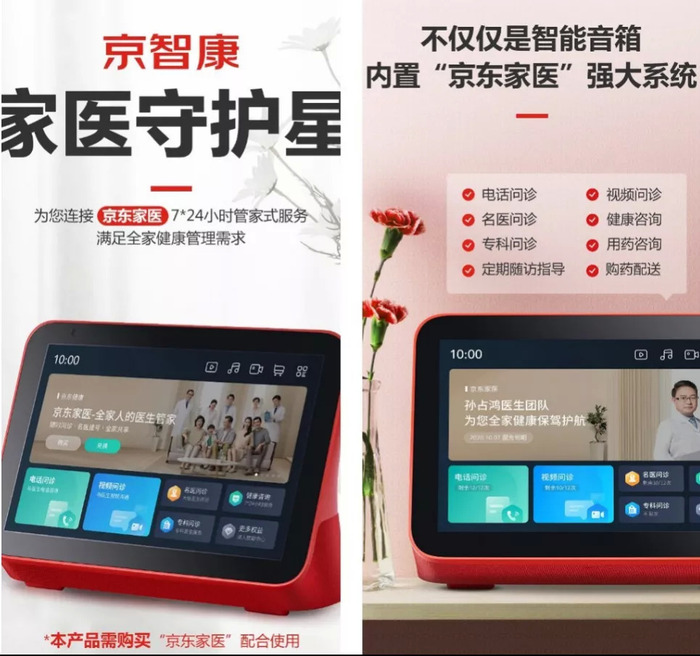
Picture: JD.com Group Launches "Home Doctor Guardian Star" Smart Speaker
The offline service scene mainly promotes intelligent elderly care in a technical way, and opens the door of the elderly care industry through the key of artificial intelligence offline. For the elderly at home, JD.com Group has launched "Home Doctor Guardian Star" smart speakers, "Elder Smartphones", and smart hardware products such as wearable devices for intelligent health management.
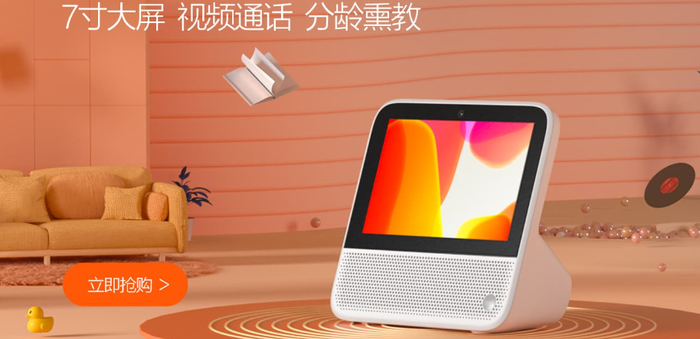
Picture: Tmall Genie
Alibaba uses the smart speaker "Tmall Genie" as the central control hub to build a "smart networked nursing home" to control high definition wireless cameras, various sensors, smart switches, LED smart light bulbs and other equipment. Tmall Genie cooperates with nursing homes in Beijing and other places to launch smart networked elderly care projects, providing advanced AI elderly care solutions for more nursing homes.
At the same time, they will also choose to cooperate with offline hospitals, offline health care communities, nursing homes and other institutions, and use their own advantages to empower health care institutions with digital intelligence technology to achieve online and offline integration, full-scene medical health and health care services, forming a closed loop for users from online consultation to in-hospital diagnosis to post-consultation health management.
4. The battle for talent could become the next point of competition
At present, in addition to relying too much on "selling drugs" for Internet + medical health revenue, its biggest disadvantage with traditional medical institutions lies in the training of doctor teams, especially in the Internet hospital sector, which has been opened by major Internet companies. The training of doctors is very weak.
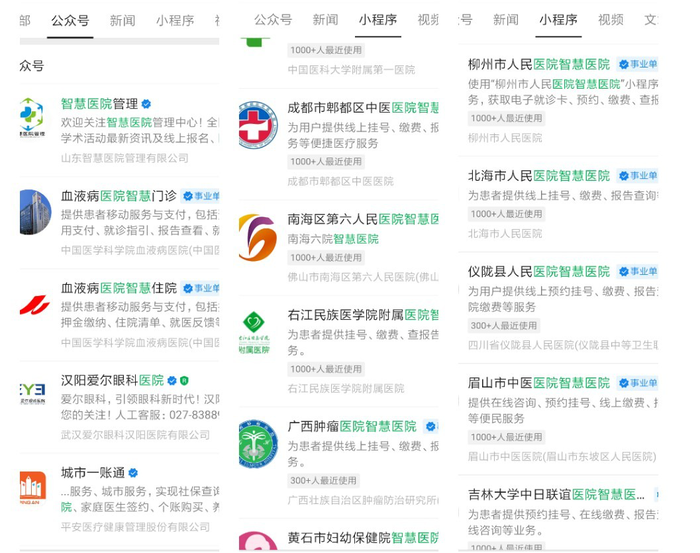
Picture: The majority of physical hospitals are actively joining the construction wave of Internet hospitals
We can clearly see that Internet companies are playing more of the role of platform providers in Internet hospitals, consultations and other service links. This implies a problem, that is, when many Internet companies are starting to build "Internet hospitals" and "conquer cities and territories", whoever has the talent resources will have the advantage. Therefore, how to deeply bundle hospitals so that they can establish long-term cooperation with platforms? This is also the problem that Internet companies face when they smoothly enter from medical retail to health services.
The worst situation is that if there is a vicious competition, it may bring the dilemma of "choosing one of the two" to traditional hospitals. It will also cause chaos in Internet + health services and affect the market order. Of course, some Internet companies have also seen this problem, such as: JD.com Health and Geriatrics Center will cultivate geriatric medical talents through the establishment of geriatric medical schools, and promote the integrated development of medical services and health care services. And these self-trained professionals will also be transformed into talent reserves and enhance their competitiveness in the field of health services.
Conclusion:
Internet Tech Giants have unique advantages in terms of human, material and financial resources. Their competition in the field of health services will promote the upgrading of elderly health services, and will also bring more changes and innovations to the slightly dull elderly care industry. In the battle for medical and health care, whether it is a "hegemon" like Ali and JD.com or an "expert" like WeDoctor, Good Doctor, and Lilac Garden who win the final victory, it will bring a profound change to the elderly care service industry.